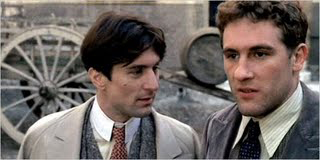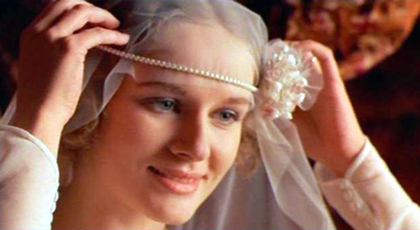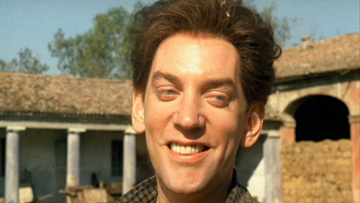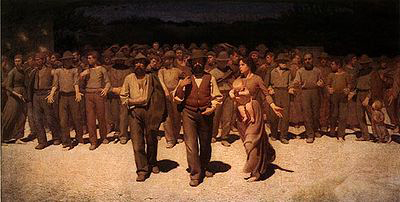
 |
|
|
|
Speaking out at the Cannes debut of his enormous, budget-busting epic 1900, director Bernardo Bertolucci said that he was pleased to see American corporations funding what was essentially a five-hour tribute to the red Communist flag. Three studios put up the money for Bertolucci's grand tale of social change in Italy's agrarian heartland. Although the finished film does indeed depict the awakening of the Italian Communist Party and the suffering of the peasant class under Mussolini's opportunistic fascists, the emphasis here is on the personal dimension: the political upheaval of the first half of the 20th century was felt almost everywhere. The title 1900 is a bit misleading, because meaning of the original Italian title Novecento is "the 1900s", in English, "the 20th century". Filming the expensive 1900 required foreign financing, which destined 1900 to be an "international" production dubbed into multiple languages. Had it been made in the early 1960s the major roles might all have gone to Italians, but Bertolucci's cast includes the hot American property Robert De Niro, Canadian Donald Sutherland and the major European stars Gérard Depardieu, Dominique Sanda and Stefania Sandrelli. Burt Lancaster and Romolo Valli are on board to evoke memories of Visconti's The Leopard, while Sterling Hayden is fresh from the first Godfather film. 
The investors saw big problems when the completed 1900 came in at five hours and fifteen minutes. Bertolucci had also filmed sex content unacceptable for American screens of 1976. His 1972 Last Tango in Paris had emphasized notorious sex scenes, but its nudity was all female; here both De Niro and Depardieu appear in graphic full-frontal foreplay scenes with actress Stefania Casini. Add to that the vicious murder of a small boy after an implied child rape, and 1900 was un-releasable at its uncut length. All in all, 70 minutes were dropped for the film's "R" rated American bow. Olive Films' Blu-ray presentation is said to present the director's original uncut version. Despite its more extreme content, 1900 is a fascinating multi-generational saga of an entire society forced to change with the violent events of history. In 1901 two boys are born. One is Alfredo (as an adult, Robert De Niro) the latest hereditary padrone of the Berlinghieri clan of landowners. Alfredo's father (Paolo Stoppa) is overwhelmed by the responsibility of managing their large farm, especially after the death of his father (Burt Lancaster), a fairly brutal overlord frustrated by old age and angry that his life among the dairy cows adds up to little more than "milk and s___." The peasant clan that works the Berlinghieri acres are the Dalcòs, headed by the distrustful Leo (Sterling Hayden), who hates his padrone even as he accepts his servitude. The peasant class are little better than slaves, expected to bear the burden when times are bad but never invited to share the wealth when times are good. The other new boy of 1901 is Olmo Dalcò, (as an adult, Gérard Depardieu). Alfredo and Olmo grow up together, sharing forbidden adventures like playing on the railroad tracks. The headstrong Olmo resists being sent away to be educated, while the more passive Alfredo balks at exercising the power wielded by his boorish father. When The Great War comes Olmo leaves to fight, while Alfredo's father buys him a deferment. With so many peasants absent, the Berlinghieris are forced to invest in farm machinery, and a foreman to keep the workers in line. He is Attila Mellanchini (Donald Sutherland), an opportunist who exploits class frictions to better his own status. Alfredo comes into his property but does nothing to stop Attila's cruel management of the workers. Attila shows his true colors when the fascists rise to power. 
Olmo embraces the Communist movement with his new love, teacher Anita (Stephania Sandrelli), a relationship that ends in tragedy. Olmo and Alfredo enjoyed some earlier adventures together in the city, but now Alfredo spends time with his uncle, Ottavio (Werner Bruhns), the artistically sensitive 'black sheep' of the family. Alfredo falls in love with Ottavio's friend Ada Flastri (Dominique Sanda), an extravagant heiress. They eventually return to the country to marry, but personal differences and political forces spoil relationships and endanger lives,. When WW2 comes Alfredo continues to protect the dissenting Olmo, but now dares not openly oppose the murderous fascist Attila. Filmed from an original screenplay by Franco Arcalli and Giuseppe & Bernardo Bertolucci, 1900 is a sensual delight. In contrast to the cool art deco opulence of Bertolucci's The Conformist, the film presents a convincing agrarian society of masters and servants. The Berlinghieri manor house is a showcase of fine living, while just a few feet away the peasants live in hovels from the Middle Ages. The word 'earthy' doesn't begin to describe the country people's relationship with dirt, with animals, with manure -- and an economy organized to keep the workers poor, filthy and uneducated. The film's epic length allows the story to unfold at a proper place, pausing for detail and atmosphere. Important days are packed with dramatic events, such the big country wedding with its surprise appearance by Ottavio followed by the discovery of a terrible murder. Although the story frequently skips ahead, ellipsing years at at time, the character stories are easy to follow. Director Bertolucci's vision of history in motion creates one striking scene after another. The peasants that reject a primitive hay-raking machine, end up toiling like ants around a larger baling mechanism powered by a steam tractor. Little Olmo collects frogs and threads them around his head, forming a wiggling green crown. He and Alfredo examine their private parts, forming a brotherly bond that eventually sees them visiting a prostitute together as young adults. When Alfredo's father joins with fascist sympathizers to plot against the rebellious workers, Alfredo and his Uncle Ottavio retreat to the pleasures of the city and excursions to fancy hotels. One impressive set piece sees Alfredo bringing his new conquest Ada to a local peasant celebration, where they briefly dance alongside Olmo and Anita. The capricious Ada patronizes the farmworkers, and then overdoes her apologies. 
Bertolucci smoothly introduces the growing menace of fascism. Donald Sutherland reportedly could not bear to watch his performance in this movie, which may represent the best acting of his career. Attila Mellanchini is an intolerably sadistic menace. He kills a cat in public to prove his fascist mettle (apparently a documented fact), and scapegoats Communists when he murders for profit. Attila's villainy is all the more powerful for being so blatantly obvious -- it's as if Alfredo is in denial about his foreman's activities, fearing a larger fascist backlash if he acts. The end of the war shows the fascists defeated. But the newly liberated peasants are far too ready to accede to whatever authority comes along. Even as they're waving their giant quilt-banner of communist flags, they surrender their arms to the first truck of partisans that demands them. The ever-passive Alfredo is put on trial, while Olmo delivers a Communist speech directly to the camera. He blames the abusive and selfish landed padrones for everything, as their neglect of social justice made room for the fascists to take power. Olmo may be voicing director Bertolucci's beliefs but the film invites us to judge events and personalities for ourselves. The writer-director celebrates the peasant victory, yet affirms that they seem wholly incapable of forming a viable democracy. The cast forms an impressive ensemble, not a group of guest performances around the leading star. As he plays such an indecisive character, Italian-American Robert De Niro does not dominate the proceedings. He seems content to simply survive the century's chaotic events. The film's real conscience is Gérard Depardieu's salt-of-the-earth Olmo, who stays true to his convictions from the first to the last. We see Dominique Sanda's Ada evolve from an carefree playgirl into a frustrated country wife, who can't understand why her husband doesn't intervene against Attila's horrible crimes. Burt Lancaster and Sterling Hayden launch the film with grand portraits of ancient patriarchs locked into predetermined roles, while the fine Romolo Valli (Giù la testa) finds his only calling in life when he becomes a fervent supporter of Mussolini's fascism. Also making strong contributions are Laura Betti as Attila's equally horrid wife Regina, Anna Henkel as Olmo's spirited daughter, Alida Valli as a woman swindled by Attila and Regina, and Maria Monti as Olmo's patient mother. 
Although some of its sex content will make it too strong for casual audiences, 1900 is a worthy epic to stand beside Bertolucci's subsequent The Last Emperor. An absorbing drama, it is one of few large-scale multigenerational epics not to lose itself in narrative tangents or meaningless spectacle. Olive Films' Blu-ray of 1900 is a beautiful transfer of this marathon film experience, that required special handling for theatrical exhibition. In Italy it was shown as two separate releases (Atto Uno and Atto Due). Olive's presentation bears a choice of international dub tracks, none of which can be singled out as the 'original'. Although the Italian mono track may be the one supervised by Bertolucci, only the English 2.0 stereo mix gives us De Niro, Lancaster and Sutherland speaking with their own voices. The English dub is quite well done. Ennio Morricone's music score is most effective in scenes promising menace. Olive presents 1900 on two separate Blu-ray discs. A third DVD disc contains Reflections on Cinema, an RAI TV documentary from 2002 on Bernardo Bertolucci's career from his early poetry writing (we see Pier Paolo Pasolini lauding him at an awards ceremony) through his decades of film successes. The box art reproduces the film's original American poster, now a collector's item.
On a scale of Excellent, Good, Fair, and Poor,
1900 Blu-ray rates:
Footnote: 1. A helpful note from valued correspondent "B", 6.12.12: Dear Glenn: "All in all, 32 minutes were dropped for the film's 'R' rated American bow." By the time 1900 finally premiered in the United States -- over a year after its Cannes premiere, at the 1977 New York Film Festival -- Paramount, which had once basically refused to release the film in any form whatever, had at last prevailed upon Bertolucci to cut the picture down to four hours and five minutes. This is roughly seventy minutes shorter than this Olive disc (note: correction made), the version that played in two parts in most of the rest of the world. [The strong sexual content in film was cut or censored to an extent in some countries to be sure.] When Paramount at last opened the uncut 1900 in the U.S. in 1991, I was almost shocked to find that it likely wasn't the film's ample quantities of sex and violence that had initially so offended Paramount. The uncut movie is certainly an NC-17 experience, of course, and not for the squeamish. Rather, I'm sure the point of contention for the studio was almost certainly the resplendently joyous Communist demonstration/celebration sequence late in the film. This runs for nearly forty minutes, and politically-nervous Par executives were reportedly livid; there's almost no trace of this in Bertolucci's four hour version. Hey -- you like this one almost as much I do! The Morricone score is really brilliant, I think. There were moments watching this in theatres back in the '70s when Bertolucci and Storaro would move the camera, and I would feel I'd gone to heaven. I love the movies. Best, Always. -- B.
Reviews on the Savant main site have additional credits information and are often updated and annotated with reader input and graphics. Also, don't forget the 2011 Savant Wish List. T'was Ever Thus.
Review Staff | About DVD Talk | Newsletter Subscribe | Join DVD Talk Forum |
| ||||||||||||||||||